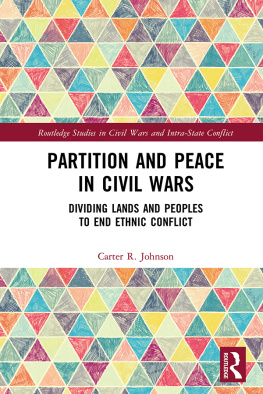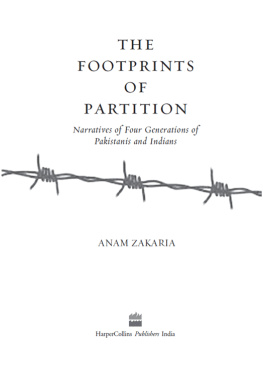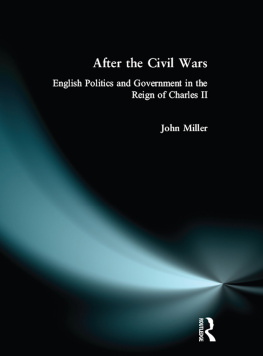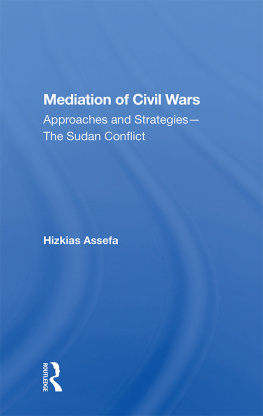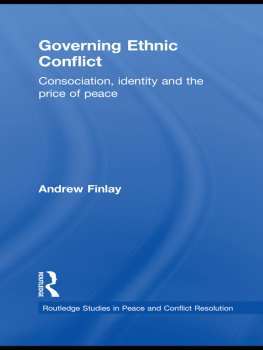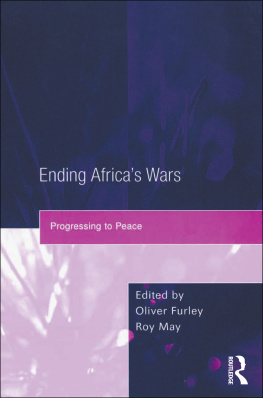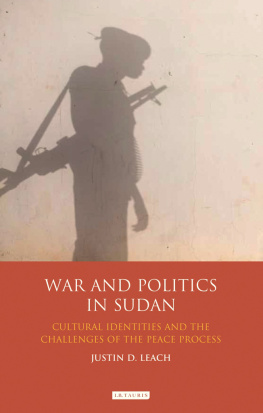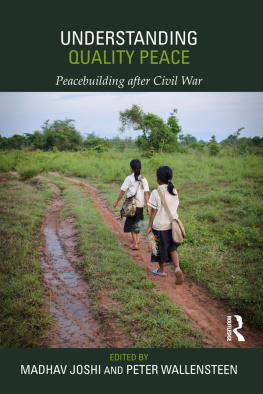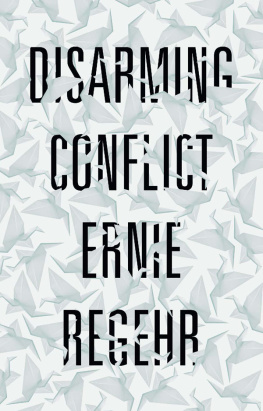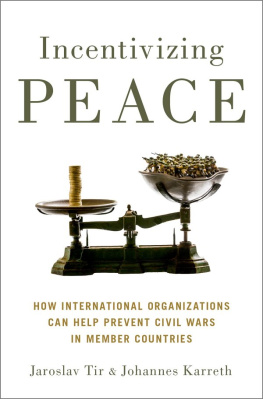Partition and Peace in Civil Wars
This book examines whether partition is an effective means to resolve ethnic and sectarian civil wars. It argues that partition is unlikely to end ongoing ethnosectarian civil wars, but it can increase the likelihood of preventing civil war recurrence, as long as the partition separates civilians and militaries. The book presents in-depth case studies of GeorgiaAbkhazia and MoldovaTransnistria, in addition to cross-national comparisons of all ethnosectarian civil wars between 1945 and 2004. This analysis demonstrates when partitioning a country can help transform an identity-based civil war into a lasting peace. Highlighting practical and moral challenges of separating ethnosectarian groups, the book contends that complete partitions cannot be easily implemented by the international community, and this limits their applicability. It also demonstrates that ethnosectarian civil wars are driven less by inter-group antagonisms and more by state breakdown, meaning displaced minorities can reintegrate peacefully after partition as long as a minimal level of state-building has been completed. The book ends by examining whether partition would be useful for five contemporary conflicts: Iraq, UkraineDonbass, Afghanistan, SudanSouth Sudan, and SerbiaKosovo.
This book will be of much interest to students of civil wars, ethnic conflict, peace and conflict studies, and international relations.
Carter R. Johnson is an associate faculty member at HSE University, Russia.
Routledge Studies in Civil Wars and Intra-State Conflict
Series editors: Edward Newman, School of Politics and International Studies, University of Leeds, UK and Idean Salehyan, University of North Texas, USA.
This series publishes theoretically rigorous and empirically original scholarship on all aspects of armed intrastate conflict, including its causes, nature, impacts, patterns of violence, and resolution. It welcomes work on specific armed conflicts and the micro-dynamics of violence, on broad patterns and cross-national analyses of civil wars, and on historical perspectives as well as contemporary challenges. It also seeks to explore the policy implications of conflict analysis, especially as it relates to international security, intervention, and peacebuilding.
Armed Group Structure and Violence in Civil Wars
The Organizational Dynamics of Civilian Killing
Roos Haer
Social Movements and Civil War
When Protests for Democratization Fail
Donatella della Porta, Teije Hidde Donker, Bogumila Hall, Emin Poljarevic and Daniel Ritter
Foreign Intervention, Warfare and Civil Wars
External Assistance and Belligerents' Choice of Strategy
Adam Lockyer
Armed Groups and International Legitimacy
Child Soldiers in Intra-State Conflict
William Plowright
Partition and Peace in Civil Wars
Dividing Lands and Peoples to End Ethnic Conflict
Carter R. Johnson
For more information about this series, please visit: https://www.routledge.com/Routledge-Studies-in-Civil-Wars-and-Intra-State-Conflict/book-series/CIVILWARS
First published 2022
by Routledge
2 Park Square, Milton Park, Abingdon, Oxon OX14 4RN
and by Routledge
605 Third Avenue, New York, NY 10158
Routledge is an imprint of the Taylor & Francis Group, an informa business
2022 Carter R. Johnson
The right of Carter R. Johnson to be identified as author of this work has been asserted by him in accordance with sections 77 and 78 of the Copyright, Designs and Patents Act 1988.
All rights reserved. No part of this book may be reprinted or reproduced or utilised in any form or by any electronic, mechanical, or other means, now known or hereafter invented, including photocopying and recording, or in any information storage or retrieval system, without permission in writing from the publishers.
Trademark notice: Product or corporate names may be trademarks or registered trademarks, and are used only for identification and explanation without intent to infringe.
British Library Cataloguing-in-Publication Data
A catalogue record for this book is available from the British Library
Library of Congress Cataloging-in-Publication Data
Names: Johnson, Carter R., 1974- author.
Title: Partition and peace in civil wars : dividing lands and peoples to end ethnic conflict / Carter R. Johnson.
Description: Abingdon, Oxon ; New York, NY : Routledge, 2021. | Includes bibliographical references and index.
Identifiers: LCCN 2021005401 (print) | LCCN 2021005402 (ebook) | ISBN 9780367673789 (hardback) | ISBN 9780367673802 (paperback) | ISBN 9781003131090 (ebook)
Subjects: LCSH: Peace-building. | Partition, Territorial. | Civil war--Prevention. | Ethnic conflict--Prevention.
Classification: LCC JZ5538 .J64 2021 (print) | LCC JZ5538 (ebook) | DDC 303.6/4--dc23
LC record available at https://lccn.loc.gov/2021005401
LC ebook record available at https://lccn.loc.gov/2021005402
ISBN: 978-0-367-67378-9 (hbk)
ISBN: 978-0-367-67380-2 (pbk)
ISBN: 978-1-003-13109-0 (ebk)
DOI: 10.4324/9781003131090
To O., born alongside the birth of this book.
This book was written in fits and starts. I remain ambivalent about its publication, out of concern for how some of its results could be abused by the disingenuous, but am soothed by the hope that reading the chapters in their entirety provides a richer context of partition than could be accomplished by anything shorter I could have written.
Mark Lichbach is the most important starting point for the acknowledgments. He saw the projects promise during my initial exploration as a graduate student at the University of Maryland, supported its ideas during incubation, demonstrated immeasurable patience as I pursued too many alternative avenues, and provided the pragmatic wisdom needed to move me forward to the first drafts completion as a dissertation. Jon Wilkenfeld and Amy Pate gave me the home I needed at the Minorities at Risk Project and Center for International Development and Conflict Management that home provided the space, support, learning, and distractions I needed at all the right moments of this projects early development. Diana Dumitrus endless readings of drafts, unvarnished feedback, intellectual companionship, and unconditional support across a long time horizon meant this project developed, improved, and made its way to publication; her love throughout has meant more than anything. I was fortunate to have Johanna Birnirs perceptive and discerning guidance as I moved from planning to field research to writing. The DC Area Workshop on Contentious Politics taught me a lot about how others research can be improved, as well as providing influential comments on earlier chapter drafts. Participating in the DC Area Postcommunist Politics Social Science Workshop provided the initial stimulus to attempt to transform this into a book in 2015; I am grateful to Henry Hale for inviting me to participate and to Cory Welt and other participants for their detailed feedback. I also owe a debt of gratitude to Paul Huth, who was incredibly supportive, especially as I returned to the project later than expected; his astute and practical advice moved the project forward at key junctures.
While in Moldova and Georgia, I benefited from the support, insights, and magnificent hospitality of more people than I deserved. I hope to honor what Ive learned from them by demonstrating the same level of generosity to others in the future. Special thanks to Giorgi Basaria, Igor Cau, Sergiu Cataraga, Viorel Cibotaru, Maxim Gvinja, Donnacha OBeachain, Oazu Nantoi, Ion Stavil, and several others whose names I cannot share but whose guidance, introductions, and reflections helped me understand issues in a way I was incapable of on my own.

